Respiratory acidosis ss - Study guides, Class notes & Summaries
Looking for the best study guides, study notes and summaries about Respiratory acidosis ss? On this page you'll find 72 study documents about Respiratory acidosis ss.
Page 2 out of 72 results
Sort by
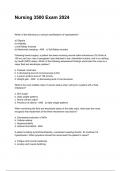
-
Nursing 3500 Exam 2024
- Exam (elaborations) • 9 pages • 2024
-
- $10.49
- + learn more
Nursing 3500 Exam 2024 Which of the following is a clinical manifestation of hypokalemia? a) Oliguria b) irritability c) soft flabby muscles d) Abdominal cramping - ANS c) Soft flabby muscles Following bowel surgery, a patient has been receiving normal saline intravenous (IV) fluids at 100 mL per hour; has a nasogastric tube attached to low, intermittent suction; and is on nothing by mouth (NPO) status. Which of the following assessment findings would alert the nurse to a m...
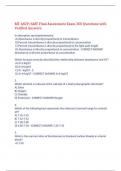
-
MT ASCP/AMT Final Assessment Exam 300 Questions with Verified Answers,100% CORRECT
- Exam (elaborations) • 65 pages • 2024
-
- $13.49
- + learn more
MT ASCP/AMT Final Assessment Exam 300 Questions with Verified Answers In absorption spectrophotometry: A) Absorbance is directly proportional to transmittance B) Percent transmittance is directly proportional to concentration C) Percent transmittance is directly proportional to the light path length D) Absorbance is directly proportional to concentration - CORRECT ANSWER Absorbance is directly proportional to concentration Which formula correctly described the relationship between ...
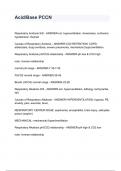
-
Acid/Base PCCN
- Exam (elaborations) • 2 pages • 2024
-
- $7.99
- + learn more
Respiratory Acidosis S/S - ANSWER-s/s: hypoventilation, drowsiness, confusion, hypotension, flushed Causes of Respiratory Acidosis - ANSWER-CO2 RETENTION: COPD, atelectasis, drug overdose, severe pneumonia, mechanical (hypo)ventilation Respiratory Acidosis pH/CO2 relationship - ANSWER-pH low & CO2 high note: inverse relationship normal pH range - ANSWER-7.35-7.45 PaCO2 normal range - ANSWER-35-45 Bicarb (HCO3) normal range - ANSWER-22-26 Respiratory Alkalosis S/S - ANSWER-s/s: hypervent...
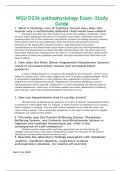
-
WGU Pathophysiology Study Guide: D236 Pathophysiology
- Exam (elaborations) • 25 pages • 2023
-
- $9.99
- + learn more
WGU Pathophysiology Study Guide: D236 Pathophysiology Lesson 1 TO Lesson 11 WGU Pathophysiology Study Guide: D236 Pathophysiology Lesson 1 TO Lesson 11: Pathophysiology Remediation Lesson 1: Homeostasis Concepts 1. Starling's Law of Capillary forces is the force behind the movements of fluid in capillary beds throughout the body. The two forces at work are hydrostatic and osmotic pressures. Homeostasis is achieved when these two forces are equal in the capillary- cell interfaces. When the hydro...

-
WGU Pathophysiology Study Guide: D236 Pathophysiology
- Exam (elaborations) • 25 pages • 2023
-
- $9.99
- + learn more
WGU Pathophysiology Study Guide: D236 Pathophysiology Lesson 1 TO Lesson 11 WGU Pathophysiology Study Guide: D236 Pathophysiology Lesson 1 TO Lesson 11: Pathophysiology Remediation Lesson 1: Homeostasis Concepts 1. Starling's Law of Capillary forces is the force behind the movements of fluid in capillary beds throughout the body. The two forces at work are hydrostatic and osmotic pressures. Homeostasis is achieved when these two forces are equal in the capillary- cell interfaces. When the hydro...
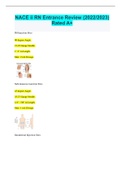
-
NACE ii RN Entrance Review (2022/2023) Rated A+
- Exam (elaborations) • 15 pages • 2023
-
- $9.99
- + learn more
NACE ii RN Entrance Review (2022/2023) Rated A+ IM Injection Sites 90 degree Angle. 21-25 Gauge Needle. 1"-3" in Length. Max: 2 mL Dosage Subcutaneous injection Sites 45 degree Angle. 25-27 Gauge Needle. 1/4'' - 5/8'' in Length. Max: 1 mL Dosage Intradermal Injection Sites Inner Forearm. Back of Upper Arm (Tricep) Below Shoulder Blades. Be sure area is free of hair, scars, tattoos. Not over a vein or bony area. 5-15 degree Angle. 25-28 Gauge Needle. 1/4''-5/8'' in Length. Max: 1 mL...
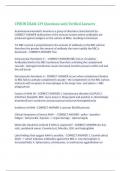
-
CPHON EXAM 139 Questions with Verified Answers,100% CORRECT
- Exam (elaborations) • 14 pages • 2024
-
- $11.49
- + learn more
CPHON EXAM 139 Questions with Verified Answers Autoimmune Hemolytic Anemia is a group of disorders characterized by - CORRECT ANSWER malfunction of the immune system where antibodies are produced against antigens on the surface of RBSs, resulting in hemolysis T/F RBC survival is proportional to the amount of antibody on the RBC surface; therefore the greater the amount of antibody the more rapidly the RBC is destroyed. - CORRECT ANSWER True Intravascular Hemolysis is - - CORRECT ANSWER ...
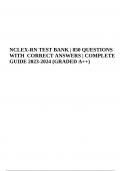
-
NCLEX-RN TEST BANK | 850 QUESTIONS WITH CORRECT ANSWERS | COMPLETE GUIDE 2023-2024 (GRADED A++)
- Exam (elaborations) • 322 pages • 2023
-
Available in package deal
-
- $30.49
- + learn more
NCLEX-RN TEST BANK | 850 QUESTIONS WITH CORRECT ANSWERS | COMPLETE GUIDE 2023-2024 (GRADED A++). Which classification of drugs is contraindicated for the client with hypertrophic cardiomyopathy? A. Positive inotropes B. Vasodilators C. Diuretics D. Antidysrhythmics Answer: A Explanation: (A) Positive inotropic agents should not be administered owing to their action of increasing myocardial contractility. Increased ventricular contractility would increase outflow tract obstruction in the ...
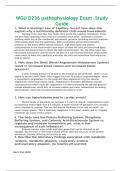
-
WGU Pathophysiology Study Guide: D236 Pathophysiology
- Exam (elaborations) • 25 pages • 2023
-
- $9.99
- + learn more
WGU Pathophysiology Study Guide: D236 Pathophysiology Lesson 1 TO Lesson 11 WGU Pathophysiology Study Guide: D236 Pathophysiology Lesson 1 TO Lesson 11: Pathophysiology Remediation Lesson 1: Homeostasis Concepts 1. Starling's Law of Capillary forces is the force behind the movements of fluid in capillary beds throughout the body. The two forces at work are hydrostatic and osmotic pressures. Homeostasis is achieved when these two forces are equal in the capillary- cell interfaces. When the hydro...
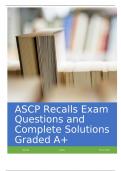
-
ASCP Recalls Exam Questions and Complete Solutions Graded A+
- Exam (elaborations) • 45 pages • 2024
- Available in package deal
-
- $13.49
- + learn more
FFP used for - Answer: Multiple coagulation deficiencies Factor XI deficiency Cryoprecipitate used for - Answer: Replace fibrinogen loss due to DIC Massive bleeding Dysfibrinogenemia with active bleeding Plateletpheresis preparation steps - Answer: Light spin (remove RBC) Heavy spin (spin down PLT and WBC) Supernatant goes into bag for freezing (FFP) Remaining plasma, platelets, and WBC = platelets Irradiated blood prevents - Answer: GVHD Also used for ca...

$6.50 for your textbook summary multiplied by 100 fellow students... Do the math: that's a lot of money! Don't be a thief of your own wallet and start uploading yours now. Discover all about earning on Stuvia


